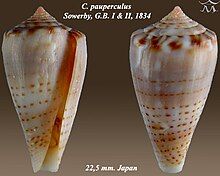Conus pauperculus
Appearance
| Conus pauperculus | |
|---|---|

| |
| Apertural and abapertural views of shell of Conus pauperculus Sowerby, G.B. I, 1834 | |
| Scientific classification | |
| Domain: | Eukaryota |
| Kingdom: | Animalia |
| Phylum: | Mollusca |
| Class: | Gastropoda |
| Subclass: | Caenogastropoda |
| Order: | Neogastropoda |
| Superfamily: | Conoidea |
| Family: | Conidae |
| Genus: | Conus |
| Species: | C. pauperculus
|
| Binomial name | |
| Conus pauperculus G. B. Sowerby I, 1834
| |
| Synonyms[1] | |
| |
Conus pauperculus is a species of sea snail, a marine gastropod mollusk in the family Conidae, the cone snails and their allies.[1][2]
Like all species within the genus Conus, these snails are predatory and venomous. They are capable of "stinging" humans, therefore live ones should be handled carefully or not at all.
Description
[edit]The size of the shell varies between 20 mm and 40 mm. The thin shell is narrow. Its color is olivaceous, with a flesh-colored central band, and numerous revolving series of small chestnut spots.[3]
Distribution
[edit]This marine species occurs off Okinawa, Japan
References
[edit]- ^ a b Bouchet, P. (2010). Conus pauperculus G. B. Sowerby I, 1834. Accessed through: World Register of Marine Species at http://www.marinespecies.org/aphia.php?p=taxdetails&id=430047 on 2012-01-21
- ^ Filmer R.M. (2010) A taxonomic review of the Conus boeticus Reeve complex (Gastropoda - Conidae). Visaya 2(6): 21-80.
- ^ G.W. Tryon (1884) Manual of Conchology, structural and systematic, with illustrations of the species, vol. VI; Philadelphia, Academy of Natural Sciences
- Filmer R.M. (2010) A taxonomic review of the Conus boeticus Reeve complex (Gastropoda - Conidae). Visaya 2(6): 21-80 page(s): 22
- Puillandre N., Duda T.F., Meyer C., Olivera B.M. & Bouchet P. (2015). One, four or 100 genera? A new classification of the cone snails. Journal of Molluscan Studies. 81: 1-23
External links
[edit]Wikimedia Commons has media related to Conus pauperculus.
